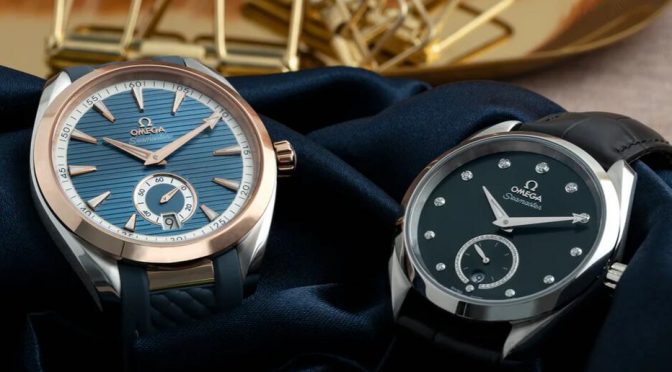
The sun had barely risen on the East Coast this morning when Omega dropped some new additions to its Aqua Terra line. These new variants look largely the same except for one tiny yet important detail – a small seconds sub-dial at six o’clock. This is a first for the Aqua Terra line and it’s being implemented in a big way as it’s now featured on a wide variety of size, color, and material options.
The new Omega Seamaster Aqua Terra Small Seconds comes in either 41mm or 38mm sizing. You can find it in just about every conceivable configuration, from stainless steel to two-tone Sedna (read, rose) gold to full 18k Sedna gold. Some of the dials are even diamond-set with mother-of-pearl indexes. The models we had an opportunity to see in the metal were a 41mm variant with a blue-grey dial, two-tone Sedna gold case, and a blue rubber strap, as well as a green dial 38mm version with a diamond-set dial and black leather strap. Four movements power the various Small Seconds watches. Two are touted as “luxury calibers,” due to an 18K Sedna gold rotor and balance-bridge.
It’s important to remember that the Seamaster line wasn’t always a dive watch for Omega. That didn’t begin until the release of the Seamaster 300 in the 1950s. According to Omega lore, the watches started as simple, no-frills, everyday timepieces. In many ways, the Aqua Terra is the modern embodiment of that ideal. That’s why it didn’t particularly shock me to see the small seconds design introduced within the line. There’s a historical precedent for Seamasters with this feature, as well. We need look no further than the relatively recent Omega Seamster 1948 Limited Editions. But don’t call it a comeback.
Ultimately, this watch provides options for those in the market for an Aqua Terra. I’m not sure if there were prospective buyers on the fence thinking to themselves, “if only this thing had a small seconds register” but either way, options are good.
I will say, that neither watch wowed me – but I think that’s a point on the positive side. The dial layout seems right at home on both watches. To say nothing about green as a dial color in 2021, that 38mm variant really struck me. I’m not one to wear diamond-set watches, but I subscribe to the “never say never” mentality, so I gave it a shot. The green dial is flat, smooth, and unassuming. And while the diamonds pop off of that backdrop, it all still feels of the piece. I especially enjoyed the diamond-encrusted outer section of the small seconds subdial. It was … icy. I’ll admit, I threw this one on wrist and didn’t hate it – didn’t hate it at all.
The other piece – the 41mm two-tone number (now we’re talkin’) felt like an entirely different watch, the 3mm difference between these two pieces is visually staggering. The two-tone Sedna gold case, with the blue dial and matching blue rubber strap caught me off-guard when I first opened the watch box. I wasn’t expecting this color combo, but it grew on me, especially when I noticed the little design flourishes. In full Omega fashion, the dial is over-engineered, with the precise laser-engraved pattern that adds so much character and depth. Now, everyone has an opinion about date windows, but I think this one adds another point of visual interest – even if it is wildly large.
Each of the four movements used in the Small Seconds are METAS certified. The 41 mm range (which includes four stainless steel editions and one in 18k Sedna gold two-tone), is powered by Omega’s Co-Axial Master Chronometer caliber 8916. There are also four models in 18K Sedna gold, powered by the luxury caliber 8917. Both movements are likely based on Omega’s 8900 calibers. The steel and two-tone 38mm models feature the caliber 8802 while the all-gold variants house the 8803, with its 18K Sedna gold rotor and balance-bridge (same as the 8917).
Overall, a small seconds subdial is just another way for you to watch every second of your life go by. Along with reminders of mortality, the subdial actually makes the dial design more minimal than ever. With its inclusion, we lose the “Co-Axial Master Chronometer” text without sacrificing the Co-Axial Master Chronometer movement. The watches still read Omega Seamaster, however. And in this short life, that’s all we need.